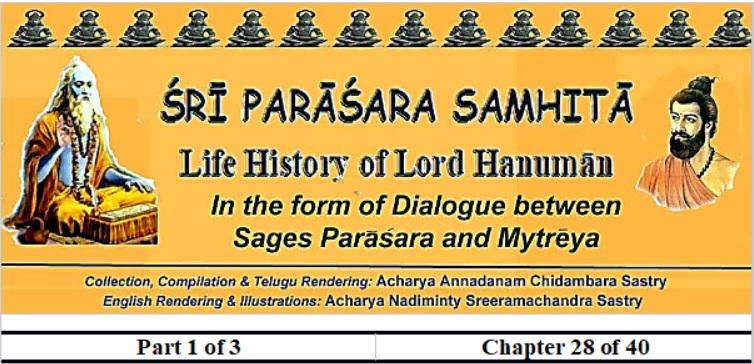
28th Chapter (Aşţavimśatitamah Paţalah)
“The Dialogue between Nārada and Hanumān”
(Nāradahanumatsamvādamm)
श्रीमैत्रये :
ब्रह्मन्! पम्पां समासाद्य कपिनाथानुयायिन:
भर्तृराज्ञावच: श्रुत्वा किमकुर्वत तद्वद।। 1
Sri Mytrēya:
“Oh! Great personality! Tell me what the aides of Hanumān were doing on reaching the Lake Pampā and listening to the words of their leader”. (1)
श्रीपराशर:
मैत्रेय त्रूणु वक्ष्यामि क्रीडितानि वनौकसाम्
सर्वभूतांतरावासो हनुमान् प्रीतिमाययौ।। 2
Seer Parāśara:
“Oh! Mytrēya! Listen to the consequences and others of the monkey warriors with whom Hanumān, the dweller in everyone’s heart, is most happy. (2)
गवाक्षश्शरभो नीलो गवयो गन्धमादन:
नलो गज: प्रहस्तश्च दर्दुरो वेगवानपि।। 3
Gavākşa, Sarabha, Neela, Gavaya, Gandhamādana, Nala, Gaja, Prahsta, Dardura and Vēgavanta, (3)
एते दश महावीरा: नीत्वा कोटिवनौकसाम्
चेरु: पम्पापुरोदेशं समृद्धफलपादपम्।। 4
The group of these ten known as Hanumaddaśaveerāh (the Ten Warriors of Hanumān) remain at the front portion of the lake that has many ample fruit-bearing trees. (4)
ऋषभस्सुमुखश्चैव पृथुर्दधिमुखस्तथा
ज्योतिर्मुखो पि सम्पाति: रुन्ध्रग्रीवस्तु केसरि:।। 5
Ŗşabha, Sumukha, Pŗdhuvu, Dadhimukha, Jyōtirmukha, Sampāti, Rundhragreeva and Kēśari, (5)
अष्टावेते महासत्त्वा: नीत्वा लक्षानि पव्म्च च
पम्पाया दक्षिणे तीरे विचेरुर्मधु संभृतम्।। 6
The very strong eight mahābalāh, along with 500,000 strong monkey force were guarding the southern bank of the Lake Pampā. (6)
मरीचि: केसरी रम्भ: तरुणो गोमुखो महान्
एते पव्म्च हरिश्रेष्ठा: सहस्राणि चतुर्दश
गृहीत्वा वानरश्रेष्ठान् विचेरु: पश्चिमे तटे।। 7
Marici, Kēśari, Rambha, Taruņa and Gōmukha, named five best of aides along with 14,000 monkey warriors guard the western bank of the Lake Pampā. (7)
सुवेषो हरिलोमश्च विद्युद्द्र्ंष्ट्रों जितश्रम:
अन्यशतवलिश्चैव चत्वारो मितविक्रमा:
नीत्वा नवसहस्राणि चेरुरुत्तरसरस्तटे। 8
Suşēņa, Harilōma, Vidyuddamştra, Jitaśrama and Satavali named aides, alongwith valourous 9,000 monkey warriors guard the northern bank of the Lake Pampā. (8)
जांबवत्प्रमुखाश्चान्ये परिवार्यांजनासुतम्
चेरुस्तत्र तदभ्यासे फलपुष्पवनांतरे।। 9
Jāmbavanta and other aides, along with Lord Hanumān, remain in the grove near the Lake Pampā, that is well endowed with fruits and flowers. (9)
पम्पां फलफलानम्रपादपोद्यानशोभिनीम्
शुद्धसत्त्ववनाकीर्णां बह्रमन्यत मारुति:।। 10
Hanumān appreciated a lot the lively surrounding groves heavily laden with great fruits and the pure and true material (śuddhasatvam) like water of the Lake Pampā. (10)
के पिविजेतुं पुष्पाणि दूरालक्ष्य च चम्पके
प्रभो समक्षं संसृत्य संघर्षाद्दुद्रुवुर्मिथ:।। 11
Offerings by Monkey Warriors
Monkey worriors were competing with each other right in front the of the Lord for the right to collect the golden champak (yellow fragrant flowers; Magnolia champaca) flowers for worship. (11)
अन्ये तान्येव पुष्पाणि गृहीत्वा तत्क्षणांतरे
प्रतिज्ञां विदथीचक्रु: अहं यूनां युवानिति।। 12
Meanwhile, others brought the said flowers already and proclaimed that they are the most capable ones and youngest among the youth. (12)
समुद्धूय परे तानि करस्थानि हठोत्तरै:
उद्धतानि गृहीत्वाशु तैरानर्चु: कपिप्रभुम्।। 13
Throwing away the ones spoiled in the scuffle they worshipped Lord Hanumān with the good ones. (13)
दृष्ट्वा कपिवरश्श्रीमान् त्रयाणां व्यावृतिं तथा
ननन्द परमोदार: सर्वभूतदयापर:।। 14
Seeing the proceedings, Hanumān, the kindest and most mindful of all the creatures, felt happy. (14)
केचित्पक्वानि जम्बूनि मधुराणि पृथून्यपि
तस्मै निवेदयांचक्रु: मनोवाक्कायकर्मभि: ।। 15
Some submitted the most ripe, biggest and sweetest of jambu (black berry or plum; Szygium cumini) fruits to Hanumān. (15)
हनुमानपि विश्वात्मा तद्रसं सूर्यवर्चसम्
स्वगोचराच्च भक्तनामिव भक्तिममन्यत।। 16
Hanumān, the Universal Soul and bright as Sun, felt that their juice is like the devotion of the devotees. (16)
अन्ये समर्चयामासु: अरुणैर्बदरीफलै:
संक्षिप्तनिकटध्वांतपद्मरागैरिव प्रभुम्।। 17
Others offered from the nearby groves red berries (Indian jujube; Ziziphus jujuba) ftuits that shone like rubies capable of driving away darkness. (17)
फलानि भुक्तशिष्टानि स्वयमर्चितवान्प्रभु:
प्रसादमिव भक्तेभ्यो यथोचितमरिंदम:।। 18
Enemy-destroying Hanumān, ate some and distributed the rest among the monkey aides himself appropriately as sanctified offereing (prasāda). (18)
अन्ये समर्पयामासु: कदलीफलमव्म्जरि:
सुवर्णकेतकीपुष्पमव्म्जरीरिव भूयसी:।। 19
Bunches of banana and fragrant golden-hued screw pine flowers (Pandanus odoratissimus; kewda or mogali) were offered by others. (19)
मधूनि मधुरास्वादसंभृतानि बहून्यपि
अन्ये निवेदयांचक्रु: गृहीत्वा तत्कृपारसम्।। 20
Others, realizing his kind nature towards all, offered him many varieties of sweet fruits. (20)
अमृतास्वादपूर्णानि द्राक्षाचूतफलानि च
खर्जूरपनसान्यस्य समानेयुर्वलीमुखा:।। 21
The monkey aides brought for Hanumān sweet nectar like grapes, mangoes, dates and jackfruits. (21)
मधूनि फलपुष्पाणि पल्लवानि मृदून्यपि
भक्तेभ्यो पि ददौ श्रीमान् फलानीव स्वकर्मणाम्।। 22
As though redeeming fruits of the acts of worship by them, Hanumān also gave them, in turn, sweet fruits, flowers and soft shoots. (22)
स्वेक्षणायैव चूतेन दर्शितां फलमव्म्जरीम्
अत्यादरेण जग्राह स्वहस्तेनैव मारुति:।। 23
The Bunch of Mango Blooms
A beautiful tertiary mango branch full of flowers in full bloom offered attracted His attention greatly and was received by Hanumān with his own hands. (23)
ततस्सन्निहितास्सर्वे जांबवत्प्रमुखा अपि
परिवव्रुर्महात्मानं मव्म्जरीदर्शनेच्छया।। 24
Immediately, Jāmbavant and the other aides of His, surrounded him to see the beauty of that bunch. (24)
जाम्बवंतमुवाचेदं हनुमान् भक्तवत्सल:
रमणीयतया तस्या: विस्मयाविष्टमानस:।। 25
Surprised at its beauty, Hanumān, the protector of devotees, said so to Jāmbavant. (25)
अहोरूपमिदं पश्य सौरभं वा निरन्तरम्
माधुर्यमधिकं चास्या: सुखस्पर्शा सुखश्रुति:।। 26
“See its wonderful visual form, pleasant fragrance, sweetness, satisfying sensation on touching and fine sound. (26)
पव्म्चेन्द्रियाणि युगपन्मव्म्जरीसन्निधानत:
एकत्र विषयादानात् भजंते प्रीतिमुत्तमाम्।। 27
All the five organs of sense are aroused at once by this bunch of flowers. (27)
रमणीयतया चक्षु: मृदुत्वेन त्वगिन्द्रियम्
रसनां मधुरत्वेन सुगन्धेनैव नासिकाम्।। 28
Its heart-warming appearance pleases the eyes, its softness – the skin, its sweetness – the toungue, its fragrance – the nose; (28)
श्रोत्रं सौरभमाकृष्टभृड्गझंकारसन्निभै:
इमां पुष्पां महारम्यां को वा न प्रीतिमाप्नुयात्।। 29
By the humming of bees that are attracted to its smell the ears – are getting satisfaction. Who does not get exalted by that very beautiful bunch of flowers. (29)
सकृíर्शनमात्रेण यदस्मान्प्रीणयत्यसौ
अनया सहकारो यं जन्मसाफल्यमश्नुते
स्वकीयमव्म्जरीदानतोषिता वयमीदृशा:।।30
The life of this mango tree, whose site gives us so much satisfaction, will be auspicious’. (30)
नारदागमनम्
इति वदति सविस्मयं कपीन्दे्र
निजपरिवारे पुरस्सरे पुरस्तात्।
भुवनहितविशिष्टसौम्यभाव:
समवततार नारदो न्तरिक्षात्।। 31
Visit by Singing Sage Nārada
As surprised Hanumān was telling all this in front of His followers, Nārada, the musician sage with a gentle countenance meant for the wellbeing of the world, descended before them from the sky. (31)
सितमणिवलयं मुमुक्षुधार्यम्
श्रवणतले स हि दक्षिणे दधान:
पवनदशचलद्गुणाभियोगाम्
निजमहतीं अनुसन्दधानचेता:।। 32
Wearing a white diamond ring in his right ear, like all those seeking salvation, he came adjusting his Mahati (stringed musical instrument) as its strings are giving out the upward and downward musical notes due to the breeze. (32)
सूर्यबिंबमध: किन्नु ज्योतिषां मण्डलं किमु
अथो वा प्रज्वलज्जाल तेजो वह्नेर्महात्मन:।। 33
That great soul’s downward flowing bright fire-like radiance is like the brightness of the Sun disc and the wheel of the zodiac signs, (they thought). (33)
उद्यत्तीव्रांशुबिंबकं निर्गच्छत्प्राग्विहायस:
इति संशयमापन्न: कपिववृन्दे तदुन्मुखे
केसरीनन्दनाभ्यासे क्षणादाविरभून्मुनि:।। 34
Is it the disc of Sun rising in the East? While the group of monkeys is in a doubt, Nārada appeared divinely before Lord Hanumān. (34)
अवतीर्णं मुनिं दृष्ट्वा सर्वे विस्मयमागता:
प्रत्यासन्नं तत:स्तुत्यमनुसन्धाय नारदम् 35
Every one was surprised seeing so descending Nārada. Then to Nārada, the worhsippable one, (35)
हनुमान् सहसोत्तस्थौ सन्त्यज्यान्यप्रयोजनम्
समश्चक्रे कपिश्रेष्ठ: नारदाय महात्मने।। 36
Hanumān reverentially bowed to that great soul, leacing all other things aside. (36)
सामात्यस्सान्तरड्गश्च प्रदक्षिणपुरस्सरम्
उपवेश्य मुनिं श्रीमान् पुष्पपल्लवसंस्तरे।। 37
Along with His ministers and faithful monkey warriors, Hanumān paid obeisance by going around him and made him sit on a sof seat made of soft flowers and fresh shoots of leaves. (37)
उपचारैर्बहुविधै: प्रीणयामास मारुति:
यथाविधि यथान्यायं शिष्टाचारन्तु पालयन्।। 38
Following the eticacy and the ordained method and with out side stepping rules, Hanumān made Nārada happy by a variety of services. (38)
मुनिं समर्चयामासु: ब्रह्मणमिव वासव:
ततो ब्रवीन्मुनिश्रेष्ठं उपविष्टं सुविष्टरे।। 39
Hanumān worshipped sage Nārada like Indra did for Brahma. Then to the confortably seated sage Nārada, (39)
कृताव्म्जलिपुटो भूत्वा मारुतिर्वदतां वर:।। 40
Hanumān the expert in speech, said so with folded hands. (40)
ब्रह्मन् सुदिनमद्यासीद्दर्शनाद्भवतो मुने!
स एव पुरुषप्राज्यो यस्य स्यात्तव दर्शनम्
कस्य वा श्रेयसे न स्यात् अमोघं दर्शनं तव।। 41
“Oh! Great sage! Today is auspicious due to your divine appearance. Only the one who has your divine appearance is the best among men. Whom doe your great sight will not give auspiciousness? (41)
शुभोदर्कं तु जन्तूनां पूर्वपुण्योत्कटार्जितम्
अधुना वर्षति श्रेयो यथात्मानन्दभागभूत्।। 42
The auspiciousness earned by virtue of earlier done good deeds, earn now soul-warming and union-promoting welfare. (42)
तप:प्रभावसिद्ध्यर्थं निस्तरड्गातरड्गिणाम्।
भवादृशां मदायत्त: कश्चिदर्थो न विद्यते।। 43
There is nothing that individuals like us can offer to you, who can control the mind via achievement of your penance. (43)
अत: प्रयोजनप्रश्नान्निरालम्बस्त्वदागति:।।
तथापि जगतां मन्ये योगक्षेमानुसन्धये
वृत्तिर्भवादृशां नूनं परार्थो हि सतां गति:।। 44
Hence, there is no need to ask about the pupose of your visit. But I really think that visits by great souls like you are only for the sake of welfare of the world. Is it not true that visits by true persons (satpuruşa) is for the good? (44)
सर्वत्र कुशलं किन्नु शक्रादीनां सुपर्वणाम्
रक्षोभि: कुटिलप्रज्ञै: तपोभिर्लब्धपौरुषै:।।
अत्युत्कटबलै: कश्चित्स्वाराज्यं न विहन्यति।। 45
Oh! Sage Nārada! Are Indra and other gods safe? Is there no threat to the position of Indra from the deceitfully cunning demons, the achievers of great powers via penance (tapōbala) and the mightly strong ones? (45)
पृथिवीं शासते केचिद्भूपा नीतिपुरस्सरा:
अधर्मसंक्रम: कश्चिन्नदत्ते हि पदं क्वचित्।। 46
Are the kings ruling the lands honestly? Has the lack of virtuousness (adharma) not taken roots anywhere? (46)
दत्तानि विधिवत्काले हवींष्यादाय यज्विभि:
देवमातृकदेशेषु कश्चिद्वर्षति वासव:।। 47
Indra, accepting the offerings in the fire sacrifices by performers of such sacrifices as per ordained rules and causing rains to fall on lands dependent on rains for cultivation, right! (47)
सद्यश्चाप्रतिबन्धेन प्रवहंत्यपि सागरम्
ऋषयो पि महात्मान: रक्षोभिर्निरुपद्रवा:।।48
Is the sea (waves) moving freely without any hindrances? Are the great-souled seers without any troubles created by the demons? (48)
अथवान्यद्विशेषेण वक्तव्यमपि किव्म्चन
आदिश्यतामिदानीं न: त्वद्धीना वयं मुने! 49
Isn’t there any thing that need be told specially? Oh! Great sage! We are submissive to your kind self. Please order us (on what to do). (49)
प्रत्यग्दृष्टिप्रभावेन ब्रह्मन् तव मनीषिण:
ब्रह्माण्डमखिलं साक्षात् पाणावामलकं यथा।। 50
Oh! Best among the Brāhmins! Yourself being a great scholar, and as a result, endowed with power of tele-vision (divyadŗşti), under the the effect of which the whole Universe is like really a gooseberry in your fist (easily approachable) and understandable’. (50)
इत्युक्तवन्तमीशानं जगतामव्म्जनासुतम्
तुष्टावोपनिषद्वाक्यै: नारदो मुनिसत्तम:।। 51
Nārada Praises Hanumān
Nārada satisfied Hanumān, the ruler of the worlds, with quotes from Upanişads (renditions of the philosophical aspects of life and knowledge). (51)
नारदस्तुति:
आव्म्जनेय नमस्तुभ्यं संसारार्णवतारक!
प्रसीद जगतां नाथ देवदेव नमो स्तु ते।। 52
‘Hanumān! Guide to the souls across the sea of the mundane world! Lord of the worlds! I bow to you. Benevolent God of gods! I bow to you. (52)
त्वामामनन्ति श्रुतय: पुरुषं प्रकृते: परम्
महदादिविकारेभ्यो विविक्तमपि मारुतिं।। 53
Vedas call and praise you in this manner – the Supreme Being (puruşatatva) different from the Nature (prakŗti), free of any ego and other viles, son of the Wind God Vāyu, (53)
अकर्तारमभोक्तारं असड्गपरमेश्वरम्
सत्यसन्धं महासत्त्वं भक्ताधीनं दयानिधिम्।। 54
One who is neither the doer (karta) nor the enjoyer (bhōkta), one without any attachments, the ultimate lord (paramēśwara), dedicated to the truth (satyasandha), mighty strong one, dweller in the hearts of devotees, one full of compassion, (54)
ज्ञप्तिमात्रमुदासीनं अद्वयानन्दरूपिणम्
भोक्तारमपि यज्ञानां फलदातारमद्वयम्।। 55
One that is unique due to the power of remembrance of knowledge, the very form of bliss, one who uses the offerings in the fire sacrifice (yagńya), one who give the fruit of fire sacrifice, with a unique single form (non-dualistic), (55)
त्रातारं सर्वलोकानां संहर्तारमपि प्रभो! 56
Protector of all the worlds and destroyer (layakāra) of everything at the end of the Yuga (time cycle), lord of lords! So does the Vedas praise. (56)
नमस्ते विश्वरूपाय ज्योतिषां पतये नम:
अबाधितस्वरूपाय पूर्णाय परमात्मने।। 57
Lord! I bow to you, the very form of the entire universe. I bow to you, the lord of all brilliant forms (jyōtirgaņāh). I by to the one with undisturbed form, one with the complete form and to the very almighty. (57)
सूत्रात्मने नमस्तुभ्यं सूक्ष्मरूपाय विष्णवे
शड्करायादिदेवाय योगिनां पतये नम:।। 58
I bow to you the form of the principle (sootraswaroopa), the micro form (sookşmaswaroopa), the capable winner, the source of auspiciousness (śubhakara), the very first god (ādidēva) and the respected yōgi (mind and soul balanced). (58)
ज्योतीरूपाय रूपाय विरूपाय सुरूपिणे
भुवो भारावताराय दिव्यमड्गलरूपिणे।। 59
I bow to you, the form of brilliance, the form, the formless, one with a good form, the one that reduces the (undesirable and evil) burden of the world and the grand auspicious form (divyamańgaļaroopa). (59)
सुवर्चलासमेताय पार्वतीनन्दनाय च
नमो वेदान्तवेद्याय शरण्याय नमो नम:।। 60
I bow to the one that is with Suvarcchala, to the son of Pārvati, to the one knowlwdgeable in Upanisads and the protector of the world (lōkaśarņnya). (60)
अहोचित्रमहोभाग्यं पम्पातटनिवासिनाम्
तृणानां तरुगुल्मानां मुनीनां मृगपक्षिणाम्।। 61
Ah! How marvelous? What a good fortune to the grass, trees, bushes, seers, beasts and birds that are around the Pampā lake! (61)
ध्वजवज्रसरोजाड्कभवत्पादाभिस्पर्शनात्
चिराय धन्यतां लेभे तृणानि स्थावराण्यपि।। 62
By simply coming in contact with your lotus feet having the signs of dhvaja (flag), vajra (diamond) and padma (lotus); signs that are important as per the science of body signs (sāmudrika); the grass, stones and boulders became auspicious since long. (62)
यत्ते पादतलस्पर्शप्रायश्चित्तकृतार्थता
संप्रार्थितापि बहुधा ब्रह्मद्यैरपि दुर्लभा।। 63
The achieved atonement (prāyascitta) obtained by the touch of the lower surface of your feet is impossible to get from Brahma and others, even after severe worship. (63)
तरुगुल्मलताश्चापि फुल्लपुष्पनिवेदनै:
मुनयो दर्शनाद्योगविधिनापि सुदुर्लभात्
पदस्पृष्टतृणग्रासप्रबललालसा अपि।। 64
The trees, shrubs and creepers are full of flowers in bloom. Though your divine appearance is impossible, sages are able to stay here by virtue of their yōga power. Though inconspicuous looking, even the blades of grass here are becoming strong. (64)
सहवासतया चात्र मृगा भेजु: कृतार्थताम्
पक्षिण: कलहंसाद्या: श्राव्यै: कलकलारवै:
मनोविनोदकरणात् कृतवन्त: कृतार्थताम्।। 65
All the animals here are achievers just by reason of togetherness. Musical ducks and other water birds became auspicious dor providing enjoyment to your mind with their pleasant cries. (65)
वंध्या: प्रसूता: पशवो मृगाद्या:
प्रसéनीरा मरुभूमयश्च
वृक्षाश्च सम्यक्फलपुष्परामा:
पम्पां प्रविष्टे पवमाननन्दने।। 66
On entry of Hanumān, great Śiva in fact, to the bank of Lake Pampā, infertile animals, beasts and others there started conceiving offspring. Dry barren lands turned into lands with fresh water. All the trees are radiant with plenty of flowers and fruits. (66)
अहो पम्पा महापुण्या मुद्रणानि पदाब्जयो:
दत्तस्पर्शानि नीरेषु सैकतेषु विशेषत:।। 67
What a great imparter of moral merit is the Lake Pampā! Oh! Hanumān! Your footprints ate in it. They (Your lotus feet) touched the water and sand dunes particularly”. (67)
इति स्तवेनाभिमुखं स मारुतिं
शिवात्मकं पावकनन्दनं प्रभुम्
जगाद वाक्यं जगतां सुखावहं
दुरात्मभूभारलघूकृतिं मुनि:।। 68
Nārada turned towards and praising Hanumān, said to the Son of Wind God, the very soul of Śiva, the son of Fire God Agni and very capable one (Hanumān) things that are instrumental in giving happiness to the world and removing the undesired weight of Earth caused by evil individuals. (68)
अवेहि सर्वत्र सुखं जनानां
कुतो विपत्तिश्शरणे त्वयि प्रभो।
कथं भवेदावरकं तमोदृशां
देदीप्यमाने दिवि सूर्यमण्डले।। 69
“Oh! Great soul! Know that people are happy everywhere. How can troubles affect (them) when refuge is taken under You? How can darkness exist when the Sun is glowing brightly in the sky? (69)
अनन्तरूपाणि विभर्षि लीलया
विना परप्रेरणया हनुमन्!
सतां हि रक्षोविषये मनीषिणाम्
भवोनियोग: पुनरुक्त एव।। 70
Oh! Hanumān! You are easily attaining uncountable forms without the help of others. You may continue to do so for the protection of good people. (70)
तथापि वाचालतया निवेद्यते
मयास्य किव्म्चिज्जगतीपते तव
अनन्यसाध्यं यदुदोहनं परै:
अशक्यसंश्राव्यमसंसृतं पुरा।। 71
Though you are all-knowing, Oh! Lord of the Universe! An earlier episode that is not achievable for others, is being told. (71)
आसीदसिर्नाम मदनस्सुतो बली
तपोभिराराधितपार्वतीपति:
तस्यायमास्ते सुत औरस: खर:
त्रिशूलरोमायितदन्तिविक्रम:।। 72
Once, there was a deamon known as Asi who worshipped Lord Śiva. He has a son named Triśoolarōma. He is mighty courageous defying even elephants. (72)
समास्सहस्त्र्ं स चचार दुस्सहम्
तपो गिरीशं प्रति गौतमीतटे
ततश्च भूतेष्वदयामुपाददौ
स्वयं बलोत्सेकतृणीकृतेतर:। 73
He performed strict penance for Śankara on the banks of River Godavri for a 1,000 months. Considering others as mere blades of grass (very week) he was merciless against all living beings. (73)
एष राक्षसशार्दूल: पम्पायामविदूरत:
विषमाद्रौ कृतावासो भेदते हर्निशं मुनीन्।। 74
This great demon lived on the Vişama Mountain close to Lake Pampa and troubling sages during days as well as nights. (74)
अन्यैरपि सुदुर्धर्ष: सन्तापयति देवता:।। 75
He has been unconquerable for gods, demi-gods (gandharvas), monkeys and other animals as well as for other demons. No one can win over him. He started troubling the gods. (75)
बलाद्गृह्णाति रम्भाद्या देवतास्त्रीर्बलोद्धतम:
अवजानाति देवर्षीन्कश्यपादीन् महौजस:।। 76
Prideful of his strength, he bad-handled Rambha and other ladies of the heaven. He has been disrespectful towards godly saints like Kaśyapa and other great souls. (76)
दिक्पाला द्राविता: तेन त्याजितस्वाधिकारिण:
निदर्शने तन्मुखाब्जानां स्वस्त्रीणां बिभ्यति स्वयम्।। 77
The rulers of the eight directions (aştadikpālakas) were so deceived by that demon, that they left their posts and were afraid to see even their faces (so humiliated). (77)
बहुनात्र किमुक्तेन सर्वतो निर्भयो प्यहम्
तस्माद्बिभेमि दु:शीलात् तपोविच्छित्तिकातर: 78
Why to tell so much? I, who gets frightened no where, am afraid that my sacred penance may be disturbed by that evil one. (78)
तदत्र दीयतां दृष्टि: हनूमन्! करुणानिधे!
रक्षणे जगतां सद्य: त्राता नास्ति त्वया विना।। 79
So, Oh! Abode of mercy! Hanumān! Give attention of Your kind self to this issue. There is no one better than Your kind self for protection of the world. (79)
जहि त्रिशूलरोमाणं लोकविद्वेषिणं खरम्
तदर्थो ह्मवतारस्ते किंन जानाम्यहं प्रभो! 80
Kill this unbearable demon Triśoolarōma, the envy of the world. Oh! Great soul! I know that you took up this incarnation for that purpose only. (80)
पुरा वदरिकारण्ये नरनारायणाकृति:
भवान्बभूव भूतात्मा स्वरूपध्यानतत्पर:।। 81
You, the soul of all living ones, were once performing meditation and penance in the Jujube Forest (present Badarįnāth) as Nara and Nārāyaņa in respective forms. (81)
तदा ब्रह्मदयो देवा राक्षसेन समुद्धता:
अनन्यशरणास्सर्वे भवन्तं शरणं ययु:।। 82
Then, greatly troubled by the demons Brahma and others sought assylum under you as there was no one else to protect them. (82)
त्वामूचुस्ते महात्मानं नरनारायणाकृतिम्
बाधन्ते राक्षसा ह्रास्मान् निर्दया घोररूपिण:।। 83
They told you, the great One and the form of Nara and Nārāyaņa, so, ‘Lord! Merciless demons with ghostly forms are troubling us. (83)
अजेया: क्रूरकर्माण: सुप्रसन्नान् कथंचन
अस्मानुपद्रुहन् स्वामिन् त्वमेव त्रातुमर्हसि।। 84
Oh! Lord!You are uncoqourable by evil-doers and very considerate. That is how you ar rightly our protector. (84)
इति सप्रार्थितो देवै: अब्रतीत्तान्भवानपि
त्रूणुध्वं देवतास्सर्वान् वक्ष्यामि हितमुत्तमम्।। 85
So prayed by the godly personalities, you said so to them, ‘Oh! Gods! I will tell everything that will benefit you. Please listen. (85)
जातो हमीश्वराद् गौर्यां हनूमान्नाम नामत:
अनिवार्यबलश्रीमान् बधिष्ये सर्वराक्षसान्।। 86
I am born to Ēśwara’s consort Gouri mother as Hanumān. With my unconqourable power and valour, I can kill the demons. (86)
इत: परं भयं त्याज्यं सुखेन स्थातुमर्हथ
इति संलालिता देवा: नरनारायणात्मना।। 87
Now, leave your fear and live happily. Thus consoled by the Nara–Nārāyana form, (87)
यथागता: तथा जग्मु: ध्यायन्तस्त्वां मनों बुजे
इति प्रतिनुतं विद्वन् पूर्वमेव दिवौकस:
पालयस्व महाभाग सत्यसन्ध नमो स्तु ते।। 88
Meditating upon you, they left. Oh! Great soul! Thus, you were praised even earlier. Oh Lord! Stickler to the truth! I bow to you; please be considerate”. (88)
इति हितमुपदिश्य विष्टापानां
रवितनयापतिमेत्य लोकनाथं
गतिमतिमकृतान्यदैव योगी
मुनिरपि पंकजजन्मन: कुमार:।। 89
Nārada, the son of Brahma the Creator, so praised the ruler of the world and husband of Suvarcchala, Hanumān. (89)
संपश्यतां दिवि तथा वसुधामरेन्द्र:
निर्यापितात्तोत्तमपराक्रमसंक्रमाणाम्
उत्फुल्लवक्त्रविनिवेदितकार्यसिद्धि:
आराध्य वायुतनयं त्रिदिवं जगाम।। 90
Nārada, the great sage with a face glowing at the satisfaction of completion of the mission via the method of the best of valour, left for the Heaven, praising Hanumān. (90)
इति श्रीपराशरसंहितायां श्रीपराशरमैत्रेयसंवादे श्रीनारद हनुमत्संवादो नाम अष्टाविंशतितम: पटल:
Thus ends the 28th Chapter, entitled “The Dialogue between Nārada and Hanumān” (Nāradahanumatsamvādamm) of Parāśara Samhitā
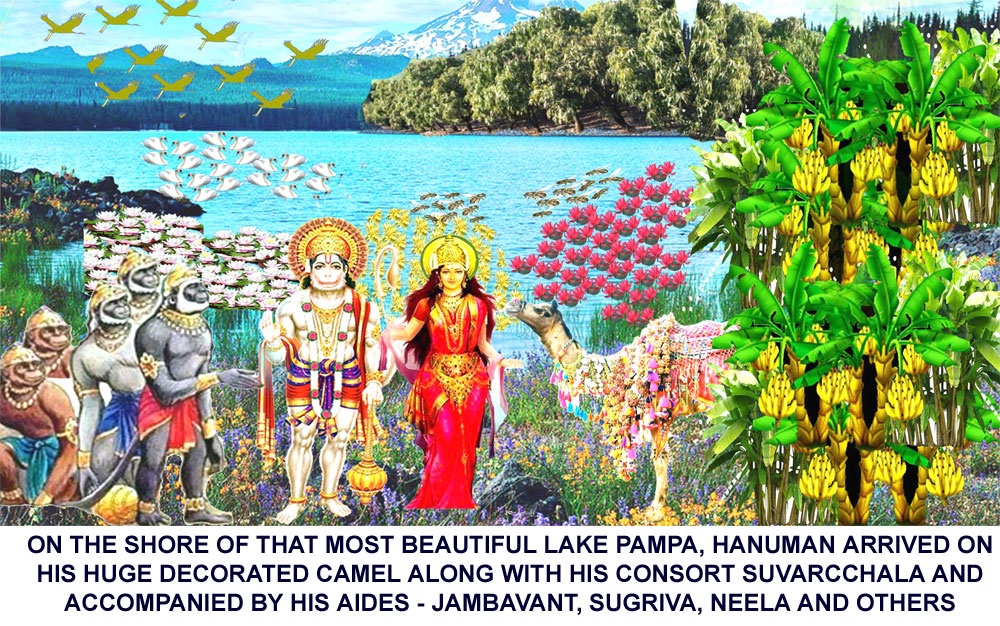
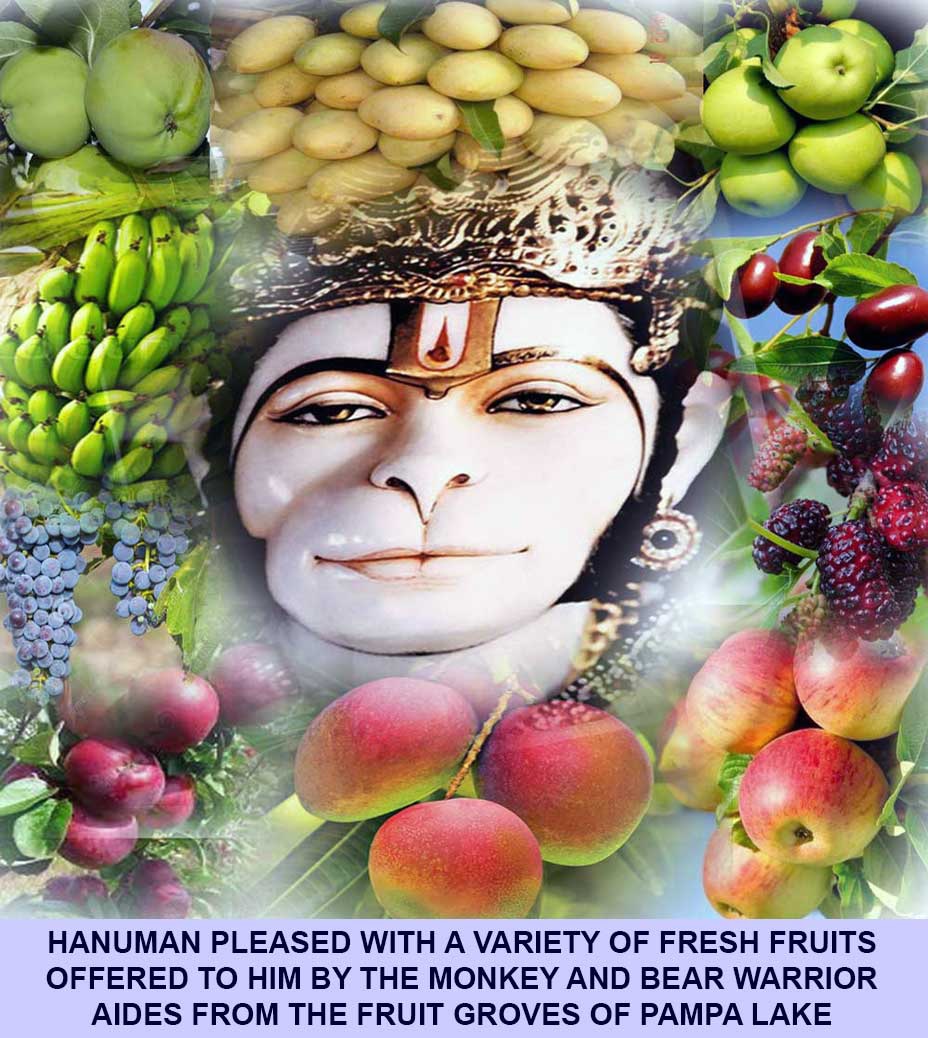
![]()

Click here to visit the Contents of the Part 1.
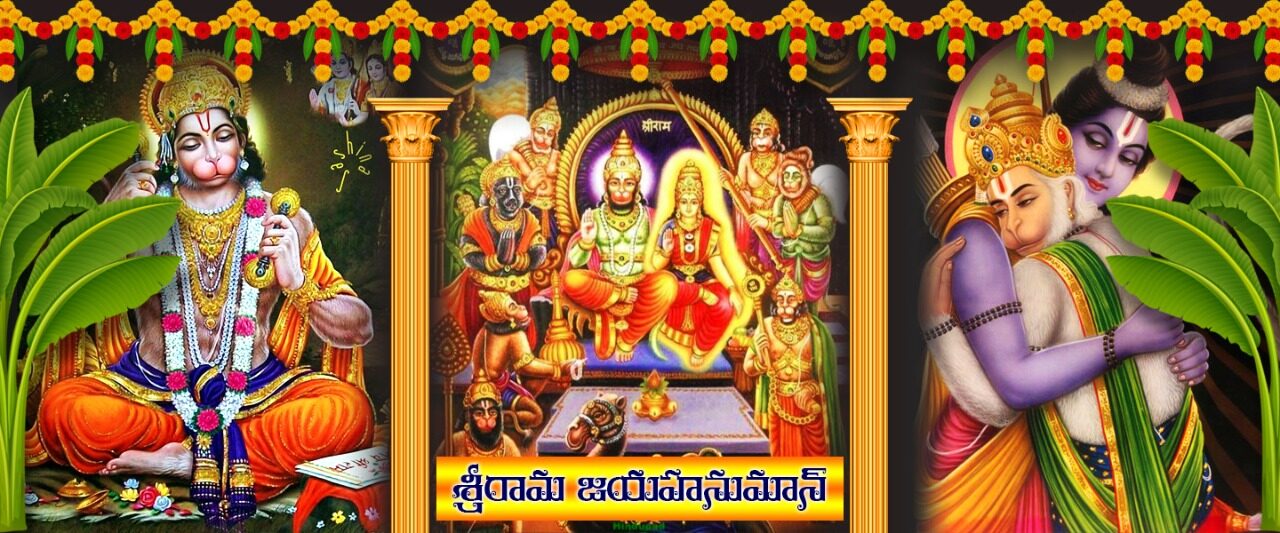



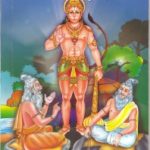


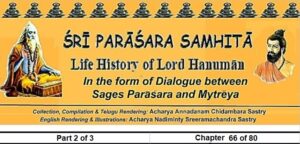


Be First to Comment